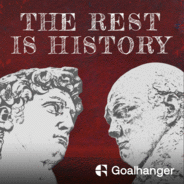
Kultur & Gesellschaft
The Rest Is History Folgen
Take a deep dive into History’s biggest moments with Tom Holland & Dominic Sandbrook. Explore the stories of History’s most brutal rulers, deadly battles, and world-changing events. From the rise and fall of the Roman Empire, the Nazi conquest of Europe, and Hitler’s evil master plan for world domination, to the French Revolution, the sinking of the Titanic, or the Norman Conquest of England in 1066, Tom and Dominic bring the past to life with gripping storytelling and expert analysis, as they unpack the high-drama moments that shaped our world. Join The Rest Is History Club: Unlock the full experience of the show – with exclusive bonus episodes, ad-free listening, early access to every series and live show tickets, a members-only newsletter, discounted books from the show, and access to our private Discord chatroom. Sign up directly at therestishistory.com. For more Goalhanger Podcasts, head to www.goalhanger.com.
Folgen von The Rest Is History
-
Folge vom 27.10.2025612. Nelson: The Final Showdown (Part 5)After two years at sea chasing the combined fleet of France and Spain, what was Nelson’s next step? Upon returning to his beloved Emma, how was the heroic Nelson received? What was the terrifying Napoleon Bonaparte scheming for his fleet across the seas? And, would Britain finally face an imminent French invasion, and with it apocalypse - for both Britain and Nelson himself? Join Dominic and Tom as they discuss the build up to one of the most totemic naval clashes of all time - Trafalgar - and Nelson; the man behind it all. _______ Start generating your own greener electricity for less, with £500 off Solar. Visit https://www.hivehome.com/history for more information. T&Cs apply* *Output and savings varies by season, electricity usage and system size. Paid-for surplus requires an eligible SEG tariff. Offer for new customers only. Ends 17th November. This episode is sponsored by Anthropic, the team behind Claude. Try Claude for free today at Claude.ai/RestIsHistory _______ Twitter: @TheRestHistory @holland_tom @dcsandbrook Video Editor: Jack Meek Social Producer: Harry Balden Assistant Producer: Aaliyah Akude Producer: Tabby Syrett Senior Producer: Theo Young-Smith Exec Producer: Dom Johnson Learn more about your ad choices. Visit podcastchoices.com/adchoices
-
Folge vom 23.10.2025Julius Caesar, with Mary BeardWhat is the main difference between Julius Caesar and Alexander the Great? When did Julius Caesar become one of the major players of the Roman Republic? What was the true nature of Caesar’s relationship with Cleopatra? How did he manage to defeat his enemies to become Dictator of Rome for life? And, how did he finally meet his violent, blood-spattered end? In the third episode of this exclusive new series on ancient history, Tom is joined again by the world renowned classicist Mary Beard, to discuss Julius Caesar: the legendary Roman general who changed Rome forever, and doomed himself along the way… _______ Twitter:@TheRestHistory @holland_tom @dcsandbrook Senior Producer: Theo Young-Smith Producer: Tabby Syrett Assistant Producer: Aaliyah Akude Video Editor: Jack Meek Social Producer: Harry Balden Learn more about your ad choices. Visit podcastchoices.com/adchoices
-
Folge vom 22.10.2025611. Nelson: Bonaparte Prepares to Strike (Part 4)With Britain at war for more than eight long years, and her people depleted and hungry, how did her government react to the news that Napoleon Bonaparte was planning a full-scale invasion in 1801? What happened when Nelson tried to attack the French at Boulogne, and what was the terrible cost? Why was the provisional peace treaty signed between the British and the French at the end of September, doomed to fail? Meanwhile, how was Nelson’s personal life with the flamboyant Emma Hamilton, in their ostentatious new home, developing? And, with Britain declaring war on France in 1803, would Nelson rally, and seize his destiny at last? Join Dominic and Tom as they trace the aftermath of Nelson’s triumph in Copenhagen, his notorious personal life, and his clashes with Napoleon’s fleet. Learn more at https://www.uber.com/onourway _______ Twitter: @TheRestHistory @holland_tom @dcsandbrook Exec Producer: Dom Johnson Senior Producer: Theo Young-Smith Producer: Tabby Syrett Assistant Producer: Aaliyah Akude Video Editor: Harry Swan Social Producer: Harry Balden Learn more about your ad choices. Visit podcastchoices.com/adchoices
-
Folge vom 19.10.2025610. Nelson: The Battle of Copenhagen (Part 3)With fears that the powerful Danish fleet would join with the French against the British, what great gamble did Horatio Nelson take? After taking the drastic decision to attack the Danish fleet in their own harbour, what challenges did Nelson and his men face? How did the bloody Battle of Copenhagen in 1801 then unfold? And, what would be the consequences of this epic naval clash for Britain, Napoleon’s France, and Nelson himself? Join Dominic and Tom as they discuss the First Battle of Copenhagen, in the next dramatic phase of Nelson’s triumphant, though very dangerous, career… ______ Start generating your own greener electricity for less, with £500 off Solar. Visit https://www.hivehome.com/history for more information. T&Cs apply**Output and savings varies by season, electricity usage and system size. Paid-for surplus requires an eligible SEG tariff. Offer for new customers only. Ends 17th November. Search Vanguard to find out more. When investing, your capital is at risk. Tax rules apply. _______ Twitter: @TheRestHistory @holland_tom @dcsandbrook Video Editor: Jack Meek Social Producer: Harry Balden Assistant Producer: Aaliyah Akude Producer: Tabby Syrett Senior Producer: Theo Young-Smith Learn more about your ad choices. Visit podcastchoices.com/adchoices
